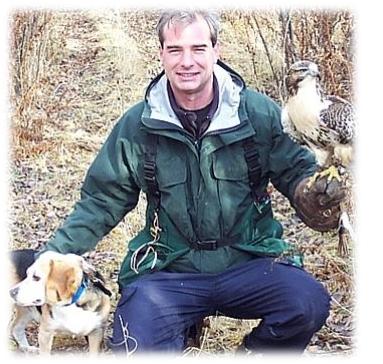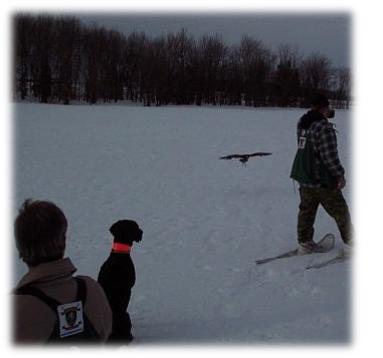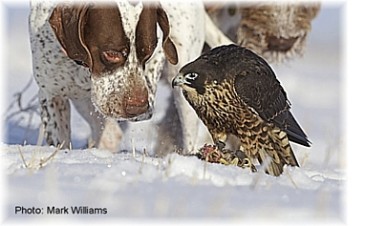The use of dogs in falconry provides a traditional and central theme throughout the sport. The decision on what dog to acquire is based on a number of factors including available quarry and terrain. Ideally the dog should be purchased and trained first before introducing the bird to the dog.
Austringers are inclined to use spaniels whereas someone flying a falcon may lean towards a pointer. Regardless of breed, the dog needs to be well trained and receptive to verbal commands, whistle or hand signals. A well trained dog will generally range ahead under the tight control of the handler. This is important as the dog should not under any circumstances be allowed to harass any animal not being hunted.
On scenting recognized quarry, one of two actions take place. If a spaniel is used, then the dog will flush the quarry for immediate pursuit by the hawk. If a pointing breed is employed the dog will hold point until such time as the dog is given a command to flush or the falconer flushes the quarry, upon which time the hawk will give chase.
Sight hounds (aka lurchers), scent hounds, and herders are also used in falconry. Some of these methods are new and developing.
Lurchers - these are pursuit dogs such as grey hounds, salukis, etc that typically are used to chase hares on open ground. Often they are used in concert with soaring raptors and falcons.
Scent hounds - these are dogs that track quarry by slowly (we hope) and continually following a scent trail. An example is using a beagle to hunt rabbits. Unfortunately, little control is had by the falconer over the actions of the dogs once quarry is found. Fast sneakers are sometimes required to keep up and telemetry is a must.
Herders - these dogs are mainly sight tracking dogs but also use scent to track and direct quarry. An example is a boarder collie. They are sometimes used in pursuit of open ground quarry such as ptarmigan and red grouse as well as in thick cover to move game birds into a desired opening to flush.
Regardless of the bred chosen, unless a falconer is highly skilled at finding game and game is highly abundant, a dog is recommended. On occasion, gamebird and snowshoe hare populations get so high that a dog only complicates the process and is not needed. However, this never lasts. Similarly, if hawking ducks a dog is not needed but this season is short lived here in Newfoundland and Labrador; with the exception of sea ducks and murrs. Like British Columbia, the Island of Newfoundland can provide excellent winter hunting with bearable winter temperatures.







